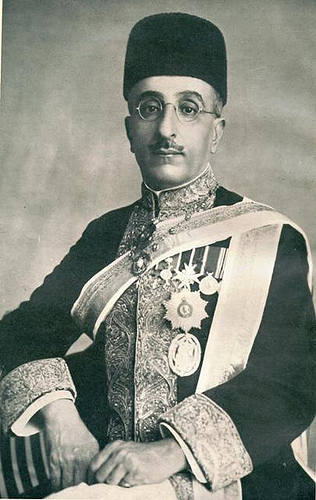This article was published in June 1947 in The Jaina Gazette (Volume XLIV, No. 6, pp. 84-86) on the occasion of a misunderstanding speech by Sir Mirza Muhammad Ismail, who was the Diwan (Prime Minister) of Mysore, Jaipur and Hyderabad in that time. So this paper, if considered as a source of contemporary history, depicts the superficial knowledge on Jainism among large parts of the Indian population of these days. The author's corrective remarks, however, are still relevant and worth reading even today.
It was a great day for Hyderabad and the Jain residents of the City and the State when His Excellency Sir Mirza M. Ismail inaugurated the grand celebrations in honour of the Birthday of the Great Apostle of Universal peace and brotherhood Lord Mahavira. The assurance and the appeal which His Excellency issued on that occasion, went home to the Jains and the representatives of various other communities present there. Concluding his speech, Sir Mirza Ismail said:
“It is the desire of His Exalted Highness to see that all sections of his people are treated with equal consideration, and it is the aim of his Government to pursue a policy best calculated to fulfil that desire, so that no individual or community may feel any grievance or suffer from a sense of inequality or wrong. I hope and trust that in the fulfilment of that aim, the Jaina Community will play a worthy part, as it has done in the past, and thereby contribute to the peace and prosperity cf the Dominions”.
The Jains feel gratified by this liberal policy and there is no doubt that the State Government will receive their full sympathy and co-operation in achieving that laudable object.
There were, however, a few remarks at the beginning of Sir Mirza Ismail's speech which are likely to create a misunderstanding about the Jain religion and the part that it has played in the social and political history of India. His Excellency said:
“Jainism was never a proselytising religion; and never allied itself with any political creed; so that it was never a political factor in Indian history like its contemporary, Buddhism.”
The view, that Jainism was never a proselytising religion, is erroneous. Lord Mahavira that last Apostle of the Jainas whose teachings form the foundation of the faith, preached against all distinctions of caste, and freely admitted amongst his followers, all people who subscribed to the creed of non-violence. His foremost disciple, Gautama, along with many others, was a convert from the Brahman Society. The Jaina community grew and gained an increasing strength by large scale, conversions into the faith as a result of the missionary zeal and proselytising efforts of the succeeding generations of his followers.
 |
Sir Mirza Muhammad Ismail (1883-1959) |
There are cases on record in ancient literature that one of the chief activities of the Jain ascetics was to make conversions. Even the present day community of the Jainas wears a stamp of these conversions from the different strata of society. Jaina preachers converted the sturdy Rajputs to Jainism and the Jaina castes like Oswal and Khandelwal are a standing example of this. The Agrawal caste of the United Provinces still presents cases of intermixture of the Jainas and the Vaishnavaite Hindus. When the Jaina ascetics penetrated the Deccan under the leadership of Saint Bhadrabahu and his royal convert the Emperor Chandragupta, they made large scale conversions by their message of peace and universal brotherhood, and Jainism became a dominant factor in the religious life of the entire South. It was in pursuance of their missionary object that the Jaina preachers studied the local Dravidian Languages and produced rich literature in them. In some cases like that of Kanarese, they gave a literary shape to the language for the first time in History. It is, thus, not true to say that Jainism was never a proselytising religion and never a far spreading faith. The truth, on the contrary, is that it was primarily a proselytising religion and as such it spread throughout India from North to South and East to West.
That Jainism never became a political factor in Indian History is again a misstatement. It is very well known to History that even during the life-time of Lord Mahavira, the contemporary monarch of the East King Bimbisara or Shrenik accepted the Jaina faith and this had a very far reaching effect upon the subsequent political history of North India. It is believed that the Emperor Chandragupta, who abdicated the throne and accompanied Saint Bhadrabahu to the South was no other than the Great Founder of the Mauryan Empire and it was this event that prepared the way for those administrative laws and regulations of his descendant Ashoka which were inspired by the fundamental creed of Jainism, namely, non-violence, in which it joins hands with Buddhism. It is well-known from his own stone-inscriptions, how King Kharavela of Kalinga was an adherent of the Jain faith which induced him to alternate all his vast conquests with great works of public service and social relief. The various royal dynasties of the South, namely the Gangas, the Chalukyas, the Rashtrakutas and many others were influenced by the teachings of Jainism, as a result of which several laws were promulgated wearing the stamp of Jainism, large endowments were made for the foundation and maintenance of Jaina Temples and other institutions, and many royal personalities even openly joined the Jain Order.
There is a very large number of stone and copper plate inscriptions as well as literary records revealing all these facts of History. The History of Gujarat during the Chalukya period was dominantly influenced by Jainism, specially under the Jain King Kumarapala. It was the Jainas who maintained a moral and spiritual tone at the courts of the Rajput Princes and Jaina ascetics were able to influence the benign Moghal Emperors like Akbar and Shah-jahan to make several concessions in the cause of non-violence and peace. The. Jaina community is still in possession of several Firmans of the Moghal Emperors bearing on this point. Several great works of architecture and sculpture which are an everlasting source of national pride and admiration from even foreigners such as the ancient images from Muttra, the colossals of Shravana Belgola and Karkala and the beautiful temples at Mount Abu were carried out by the Jains through direct royal patronage.
There are several other events of history and opinions of Western and Eastern Scholars revealing the great part played by Jainism in the social and political evolution of our country. In the light of these facts of history, it was not correct to say that Jainism never became a political factor in Indian History. It is hoped that His Excellency Sir Mirza M. Ismail will judiciously reconsider the opinion which he has expressed, in the light of the evidence set forth above and will graciously rectify his statement which would otherwise create a wrong impression on the public mind about Jainism.
In his letter dated the 9th April 1947, Sir Mirza Ismail, Prime Minister of Hyderabad State, says:
“Dear Dr. Jain,
I am in receipt of your letter of the 7th April, together with a copy of your note.
My remarks to which you have taken exception were made not in disparagement but in appreciation of the Jaina religion, which, I believe, commands universal respect not for any political eminence it might have attained, but for its sublime ethical teachings.”
 Dr. H.L. Jain
Dr. H.L. Jain